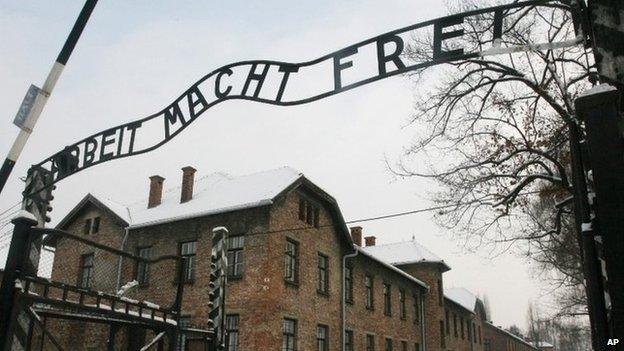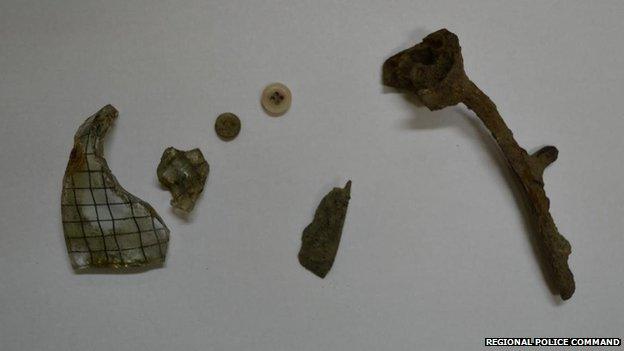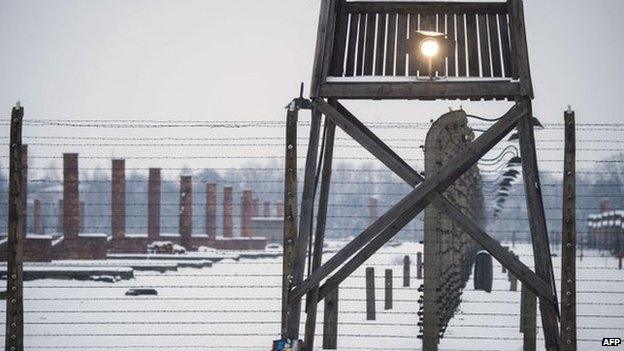British teenagers freed after Auschwitz theft apology
- Published

Two British teenagers have "apologised unreservedly" for "picking up items without thinking" from the former Auschwitz death camp, their Cambridge school says.
The Perse School says the 17-year-old boys "attempted to keep some items which they had found on the ground".
They were detained at the site on Monday and released with suspended prison sentences on Tuesday.
The school said the pupils had been fined about £170.
A spokesman for the school said they had been given a year's probation, suspended for three years.
Headmaster Ed Elliott said: "There will be a full and thorough investigation into what occurred. I want to hear directly from the boys as to what led them to take these items.
"I want to ensure that all necessary lessons are learnt. The opportunity to be able to visit Holocaust sites carries with it the duty to treat those sites with the utmost respect and sensitivity."
The teenagers were charged with unlawfully possessing items of special cultural importance, which carries a maximum 10-year prison sentence.
The BBC's Adam Easton in Warsaw said that, as with similar cases in the past, the boys were given suspended sentences and released.
"Incidents like this happen about once or twice a year, museum staff said, despite the fact notices warn visitors not to pick anything up."

Polish police released this picture of the items
Guards at the Auschwitz-Birkenau site, which is now a museum, saw the pupils picking up items from the ground near a building where Nazi German guards had stored prisoners' confiscated belongings.
Our correspondent said the grassy area once housed the storerooms where the belongings of Jews sent to the gas chambers were kept.
"When police searched the pair they found buttons, a rusted hair clipper, and fragments of spoons and glass," he added.
The independent Perse School said the boys, who were on a history trip to Poland, were being supported by the deputy head and had co-operated fully with the Polish authorities.
A spokesman said: "We understand they have explained that they picked up the items without thinking, and they have apologised unreservedly for the offence they have given, and expressed real remorse for their action".
The headmaster had previously apologised for "any thoughtless and offensive behaviour by these two pupils."
'Tells a story'
Karen Pollock, chief executive of the Holocaust Education Trust, said: "Every single artefact found at Auschwitz-Birkenau tells a story of the more than a million people who were ruthlessly murdered by the Nazis there and this incident serves to show why our work is crucial now more than ever.
"We have a duty to educate the next generation to prevent ignorance and hate, and in over 15 years of organising for thousands of British teenagers to visit Auschwitz-Birkenau, we have never known of such an incident."
The Auschwitz-Birkenau State Museum was founded in 1947 and has more than 80,000 British visitors each year.
Curators say some visitors try to take artefacts as souvenirs.
In 2010, a Swedish man was jailed for plotting the theft of the "Arbeit macht frei" ("Work sets you free") sign from the entry gate of the Auschwitz site.
Auschwitz-Birkenau, located near the city of Krakow in southern Poland, was the largest camp established by the Germans during the Second World War.
Some 1.1 million people, mostly Jews, were killed there between 1940 and 1945, when Soviet troops liberated it.

Auschwitz-Birkenau death camp

Construction began in 1940 on a site that grew to 40 sq km (15 sq miles)
About one million Jews were killed at the camp
Other victims included Roma (Gypsies), people with disabilities, homosexuals, dissidents, non-Jewish Poles and Soviet prisoners

- Published30 December 2010
